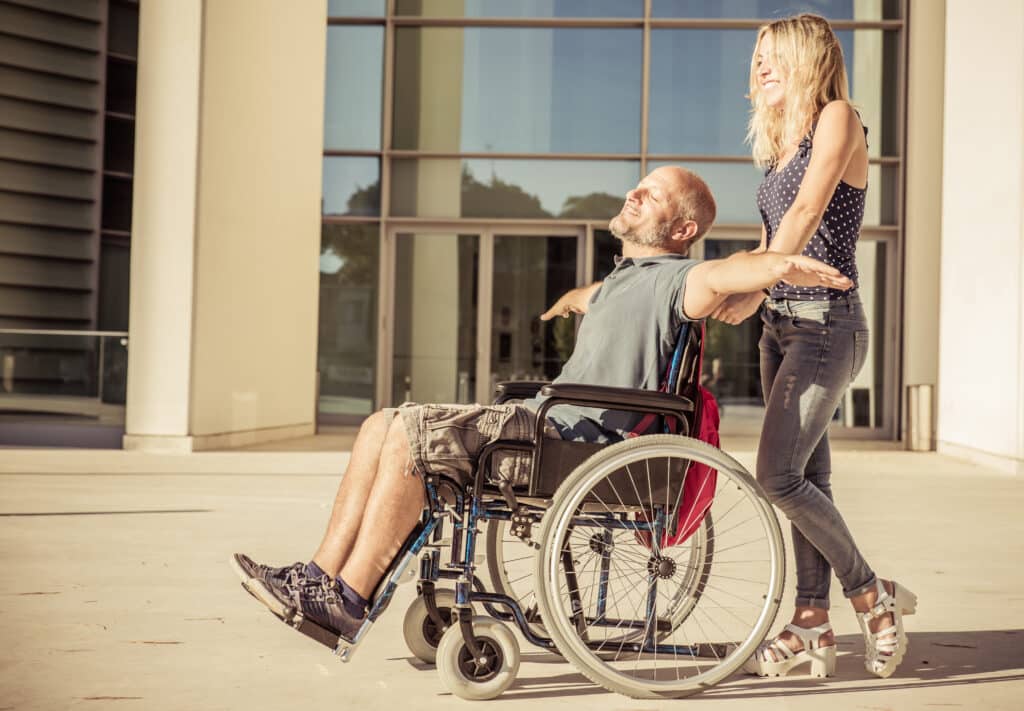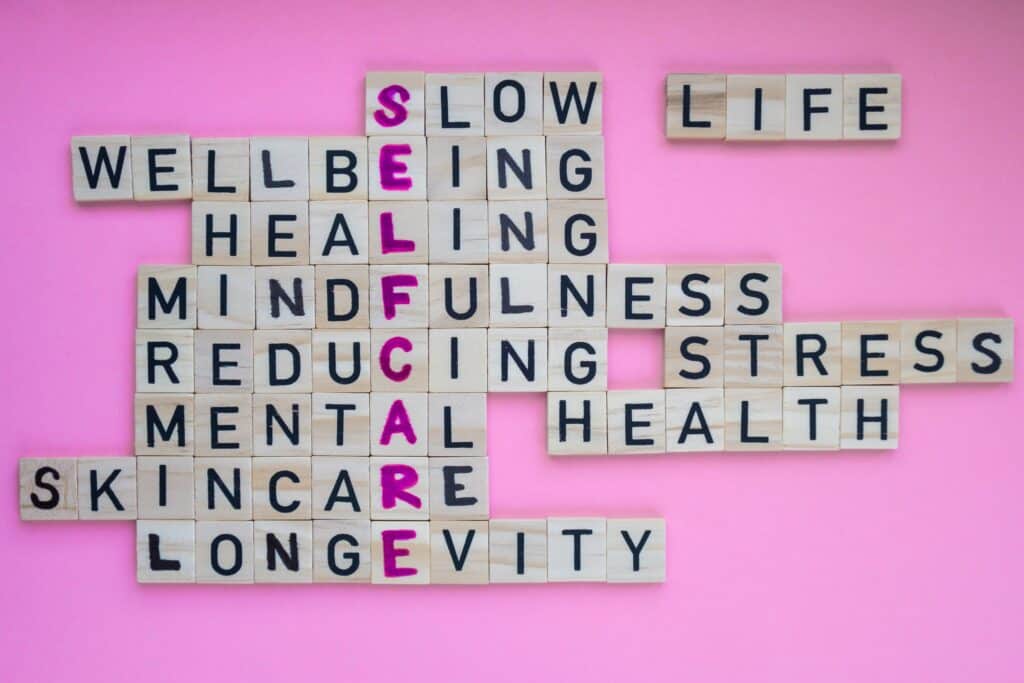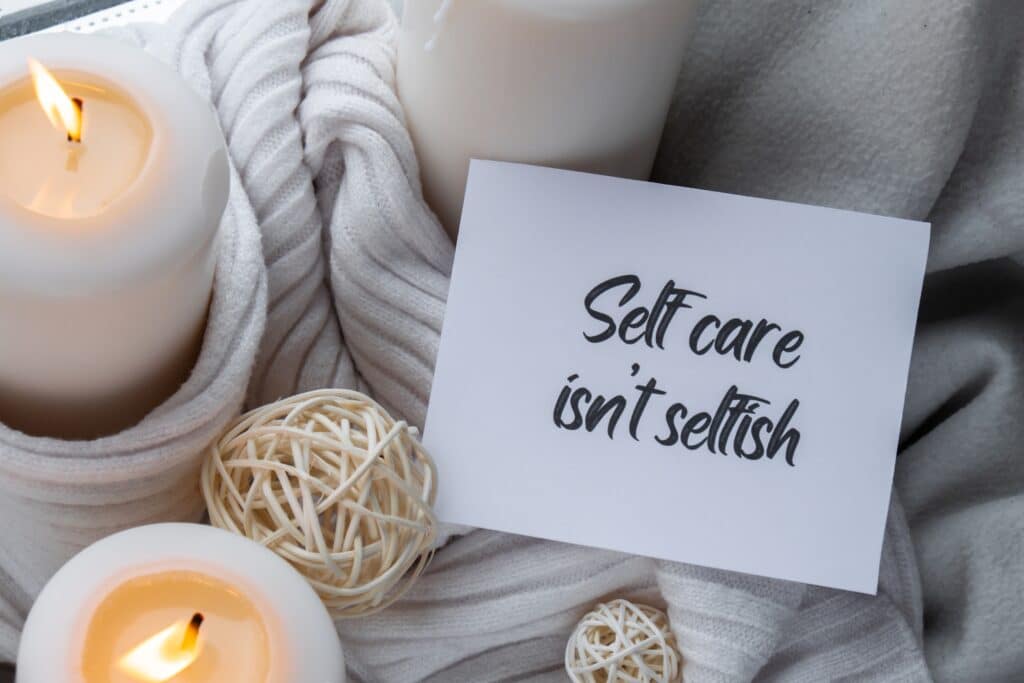7 Self-Care Tips for Military Caregivers in Recognition of National Wellness Month
August 16, 2025
August is National Wellness Month, a time to prioritize self-care, reduce stress, and build healthy routines. It is an opportunity for us all to take steps to improve our overall health and happiness.
This is especially true for military caregivers, the unsung heroes who support disabled Veterans. We know that for many of you, wellness often takes a backseat to duty.

Taking care of your loved one can be a full-time job. For example, medication management, navigating difficult symptoms, and keeping appointments can drain your time and energy. This is true even if you perform these responsibilities with a cheerful heart. You may often joke and ask yourself, “Self-care? What’s that?”
Because most of your time is spoken for, we recognize that you may not even have an opportunity to slow down to ask yourself what self-care looks like. We’ve prepared this blog with you in mind.
What is Self-Care?
This may seem like a silly question, but the answer might surprise you.
The term “self-care” is frequently misinterpreted as simply engaging in comforting distractions like binge-watching Netflix, eating a pint of ice cream, or spending a day at the spa.
While there’s nothing wrong with spending hours lost in your favorite show — and we’re certainly not about to vilify Rocky Road or boycott indulgent massages — true self-care goes beyond occasional comforts. These soul-soothing moments are lovely, but they shouldn’t be mistaken for the intentional, everyday strategies that nourish genuine well-being.

True self-care is the consistent practice of tending to the physical, mental, emotional, social, and spiritual aspects of your everyday life to promote wellness and prevent illness.
Here are 7 Self-Care Tips for Military Caregivers
As a military caregiver, it’s easy to put the disabled Veteran in your life ahead of your own needs and exhaust yourself taking care of them. However, we urge you to find a way to take care of yourself too, lest you experience burnout or compassion fatigue.
Here are some self-care tips to help you prioritize your well-being:
# 1 Prioritize Your Own Wellness
Being a military caregiver is about selfless service, but you must also learn to be of service to yourself. You can accomplish this by making time for self-care practices and listing them among your top priorities.
These include getting adequate sleep, spending time with friends and loved ones outside the home, engaging in some form of exercise, spiritual practices, and nourishing your body with nutritious meals. Prioritizing your own wellness isn’t selfish. It’s self-care.
# 2 Set Aside Blocks of Time for Yourself
It is easy to become completely consumed by caretaking duties and neglect your own needs. But, setting aside blocks of time to give back to yourself can make a positive impact on your overall state of well-being.

Maybe you wake up an extra hour early to go for a brisk walk before your family wakes up and demands your attention. Or, perhaps you stay up an hour later at night to meditate or engage in some kind of meaningful spiritual practice.
Carving out time and putting it on your schedule allows you to focus on your own health and wellness consistently.
# 3 Make (and Keep) Medical Appointments
It has been said, “If you don’t make time for wellness, you will have to make time for illness.” There is a lot of wisdom in this.
Military caregivers are often so busy taking their disabled loved one to medical appointments and managing their health care, they have little time for their own appointments. You have likely heard the expression that you can’t pour from an empty cup. If you are sick, you won’t be able to take care of anyone.
Self-care includes engaging in preventative medicine practices. Be sure and go for routine checkups, bloodwork, and physical exams. If you’re sick, see a doctor. Remember that you can receive healthcare via telehealth services through our Women of Valor program.
# 4 Step Away When You Need to and Just Breathe
Caring for a disabled Veteran can be demanding, to say the least. It is important to take a tactical pause to recharge when you’re feeling depleted, frustrated, resentful, or just “over everything,” which is a common experience for military caregivers.

Please don’t wait until you have reached your wit’s end to step away and take time for yourself. Take preventative steps to avoid burnout and stay healthy by practicing self-care as the need arises.
Step away for 15 minutes when you can during the day and take some deep breaths or bask in the sunshine. These little breaks can go a long way in the name of self-care. Apps like Mindfulness Coach (developed for military families) can guide you through calming exercises.
# 5 Say “No” When You Need To—Without Guilt
It’s okay to admit when your plate is full. Saying “no” is not only okay — it’s a radical act of self-care. When you honor your limits, you’re actually making space for rest, recovery, and the kind of balance that makes caregiving sustainable.
Setting boundaries with family or those you care for may feel uncomfortable at first, but it’s a skill that grows with practice. And remember—life is flexible. Plans can shift, conversations can be revisited, and adjustments can always be made.
# 6 Connect With a Supportive Community
You don’t have to carry the weight of caregiving alone. Finding a group of peers who understand your journey can be deeply validating. Whether it’s online through forums or in person at caregiver support groups, staying connected with others creates a sense of belonging and reduces feelings of isolation.
You can find support through our Women of Valor program. Plus, organizations like the Elizabeth Dole Foundation also offer resources and community for military caregivers.
# 7 Do Things That Nourish Your Spirit
Studies have shown that engaging in spiritual practices can improve mental health and reduce depression and anxiety. These might include mindfulness practices like meditation or yoga. It could also mean attending some type of worship service, engaging in prayer, journaling, or listening to uplifting music.

Of course, you don’t have to consider yourself a religious or spiritual person to engage in activities that feed your soul.
Painting, gardening, singing along to your favorite playlist, feeding the ducks at the local park—these are all simple, but powerful ways to give your spirit a boost.
Happy Wellness Month, Military Caregivers
Being a military caregiver requires relentless dedication, but even warriors need rest.
As you continue showing up to take care of your loved one, let this Wellness Month be a turning point — a reminder that tending to your own self-care isn’t an indulgence, it’s a necessity. Every breath you take to pause, every boundary you set, every joy you reclaim is a quiet act of courage.
We see you. We honor your sacrifice. And most of all, we encourage you to be kind to yourself.
About the Author

Bethany Heinesh is a proud Marine Corps Veteran living in San Antonio, Texas. Bethany holds a Master of Arts in Administration-Communication Arts from the University of the Incarnate Word and a B.A. in Public Relations (Minor Religious Studies) from the University of Houston.


